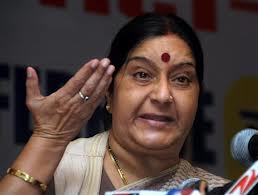
New Delhi/ Mumbai, September 2: The BJP Sunday said it stood firm on its demand that Prime Minister Manmohan Singh resign in the alleged coal scam but would allow parliament to function if the allocations were cancelled and an independent probe ordered.
Bharatiya Janata Party (BJP) leader L.K. Advani meanwhile defended the chief ministers of party-ruled states, whom the United Progressive Alliance (UPA) government has blamed for being against the new policy for auction of coal blocks.
"(Congress president) Sonia Gandhi called me three days back and asked if a debate could take place in parliament. I said they should cancel the allocations and order a fair probe. She said she would get back to me, but the talks remained inconclusive," Sushma Swaraj told media persons in Mumbai.
"However, the interpretation that the BJP has given up the demand for the prime minister's resignation is wrong."
"We have put these two conditions so that parliament can function. Even in the debate we would take the stand that the prime minister, as the then coal minister, should resign," she said.
Gandhi had telephoned Sushma Swaraj Thursday.
The BJP leader also said that her party would take to the streets after parliament's monsoon session ends Sep 7 to demand Manmohan Singh's resignation.
Advani, in the latest post on his blog, pulled up Manmohan Singh for blaming BJP chief ministers for his decision to allot coal blocks to private players without competitive bidding.
He said he was "intrigued" by the prime minister's reference to federalism, which has been rightly described by the Supreme Court as one of the basic features of the Indian constitutions and so one, which cannot be amended by parliament.
Chattisgarh Chief Minister Raman Singh's name was taken more prominently while referring to the BJP chief ministers, Advani said, noting that the May 2, 2005 letter written by Raman Singh to then minister of state for coal Dasari Narayan Rao had asked for the central government to share the revenue from competitive bidding of coal blocks with the state governments.
"Raman Singh is fully justified in demanding a share in the revenues earned by the state as a result of competitive bidding. How can this letter be cited as opposing auction?" Advani wondered.
The BJP has been disrupting parliament in the last two weeks demanding the resignation of the prime minister after the Comptroller and Auditor General (CAG) report on coal blocks allocation had claimed a presumptive loss of Rs.1.86 lakh crore ($38 billion).
The Congress has tried to deflect the attack, saying chief ministers of BJP ruled states were not in favour of auctioning of the coal blocks.
Manmohan Singh was in charge of the coal ministry for most part of the UPA-I from 2004 to 2009, and is therefore is the opposition's target for the presumptive loss calculated by the CAG.






Comments
Add new comment